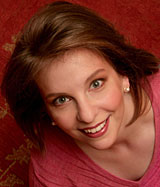Stalin’s death in 1953 marked the beginning of a cultural and political thaw that gave way to greater economic, educational and artistic freedoms in Soviet society.
In Leningrad, a seminal performance in 1961 by two towering figures of the day—composer Andrey Volkonsky (1933-2008) and pianist Maria Yudina (1899-1970)— and an attendant program of music previously censored by Soviet rule, characterized the resulting new forms of musical expression.

Pianist Orli Shaham will perform Bartok’s “Sonata for Two Pianos and Percussion” March 30 as part of “Unofficial Leningrad, 1961.”
That concert will be replicated Monday, March 30, by the Department of Music in Arts & Sciences and the Saint Louis Symphony Orchestra’s Community Partnership Program. Titled “Unofficial Leningrad, 1961,” the concert is free and open to the public. It begins at 7 p.m. in the 560 Music Center’s E. Desmond Lee Concert Hall. A reception will follow.
The 560 Music Center is located at 560 Trinity Ave., at the intersection of Delmar Boulevard. For more information, call (314) 935-5566 or e-mail kschultz@artsci.wustl.edu.
Peter J. Schmelz, Ph.D., assistant professor in the Department of Music, will introduce the program. An authority on 20th-century music produced in Russia and the Soviet Union, Schmelz is the author of “Such Freedom, If Only Musical: Unofficial Soviet Music and Society During the Thaw,” published earlier this month by Oxford University Press. It is the first book to explore this period of musical history in detail.
The program will feature Andrey Volkonsky’s “Musica Stricta” for piano solo (1956-57), Igor Stravinsky’s “Sonata for Two Pianos” (1944), Witold Lutoslawski’s “Variations on a Theme of Paganini for Two Pianos” (1941) and Bela Bartok’s “Sonata for Two Pianos and Percussion” (1938).
Celebrated pianist Orli Shaham will perform “Sonata for Two Pianos and Percussion.” A consummate musician known internationally for her interpretations of both standard and modern repertoire, Shaham has performed with orchestras around the world and with leading conductors such as Neville Marriner, Roger Norrington, Christopher Hogwood, David Robertson, Wolfgang Sawallisch, Leonard Slatkin and Robert Spano.
Her recent engagements include her Proms debut with the BBC Symphony Orchestra at Royal Albert Hall featuring Leonard Bernstein’s Symphony No. 2, “The Age of Anxiety,” and a performance of John Adams’ “Century Rolls” at Santa Barbara’s Music Academy of the West.
Shaham serves as the 2008-2009 Chamber Music Essentials lecturer for the Chamber Music Society of Lincoln Center and curates and performs in the Pacific Symphony’s chamber music series in Costa Mesa, Calif.
Also on stage will be accomplished pianists Johanna Ballou, instructor at DaySpring Centre for Arts and Education; Maryse Carlin, instructor in WUSTL’s Department of Music and director of The Kingsbury Ensemble; Seth Carlin, professor of music and head of WUSTL’s piano program; Peter Henderson, member of the St. Louis-based Ilex Piano Trio and assistant professor of music at Maryville University; and Martin Kennedy, assistant professor of theory and composition at WUSTL.
Percussionists are Henry Claude, teacher of applied percussion in the Department of Music as well as director of the Percussion Ensemble at Webster University and founder and director of the Nuclear Percussion Ensemble; and William James, principal percussion for the Saint Louis Symphony Orchestra.
Some of the program pieces were presented in Leningrad well after the time of their composition, reflecting “the process of simultaneous discovery and rediscovery that characterized the Thaw,” Schmelz said. “As a result of the new music, both foreign and domestic, that became available, young Soviet composers felt freer to experiment with new techniques like those of the twelve-tone system, then very much in vogue in Europe and America.”
The irony is that the Soviets found this system liberating, Schmelz pointed out. “It represented freedom to them while in practice, this mode of composing can be very restricting,” he said. “Historically, the music it produced has driven off more listeners than it has attracted. In contrast, in the USSR this music drew curious listeners eager to hear what the cultural authorities had been severely criticizing for so many years.”
Schmelz noted that “Leningrad, 1961” was the first important “unofficial” music concert performed in the USSR, and Volkonsky’s “Musica Stricta” was the first twelve-tone composition written in the Soviet Union.
Frequently performed by Yudina, an aggressive, controversial pianist given to reciting censored poetry from the stage, “Musica Stricta” proved to be a defining musical work of the time by any measure, said Schmelz, and launched a host of imitations by composers of Volkonsky’s generation.
“Yet, Volkonsky is arguably the most important Russian composer you’ve never heard of,” Schmelz said. “Unfortunately, his artistic legacy was small as a result of the restrictive Soviet system.”
The concert is one of nearly 300 free events the Community Partnership Program of the Saint Louis Symphony Orchestra presents each year throughout the St. Louis area. The Saint Louis Symphony Orchestra Community Partnership Program receives generous support from The Ford Foundation, Monsanto Fund, E. Desmond Lee Fine Arts Education Collaborative, MetLife Foundation and the AT&T Foundation.

|
WHO: Washington University Department of Music and the Saint Louis Symphony Orchestra’s Community Partnership Program WHAT: Concert, “Unofficial Leningrad, 1961” WHEN: 7 p.m. Monday, March 30 WHERE: E. Desmond Lee Concert Hall, 560 Music Center, 560 Trinity Ave., at the intersection of Trinity and Delmar Boulevard COST: Free and open to the public PROGRAM: Music of Andrey Volkonsky, Igor Stravinsky, Witold Lutoslawski and Bela Bartok INFORMATION: (314) 935-5566 or email kschultz@wustl.edu. |